 Home > CR Interviews
Home > CR Interviews CR Sunday Interview: Renée French
posted June 6, 2011
CR Sunday Interview: Renée French
posted June 6, 2011

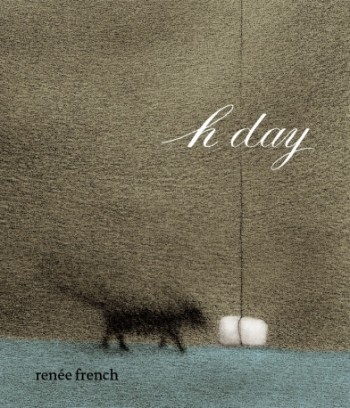
I enjoy talking to
Renée French as much as I do any cartoonist in the world. Like so many of the better comics these days, her latest, the gorgeous Fall 2010 effort from
PictureBox H Day, went though its initial sales and publicity cycle at what seemed like a slight remove from the heart of the comics-reading radar. I suspect this may have happened because
H Day arrived in a season stuffed with good books and because it explored much more obtuse storytelling territory than her more accessible
The Ticking. Told in a pair of intertwining, interrelated visual narratives that can barely be called narratives at all,
H Day engages the terrors of repeated
migraine headaches by placing them in physical proximity to a comforting urban landscape. In typical French fashion, that place of comfort turns out to be anything but: it's practically soaked with death, and the whole affair spirals towards Armageddon. Whether
H Day is a comforting work may be open to debate; what's certain is that it shows off some of the cartoonist's best-looking and most appealing art yet. It is a rewarding book and one worthy of our attention. I was happy French agreed to do an interview about a work now at least little bit in the rear view mirror. We kick things off by talking about projects yet to come. -- Tom Spurgeon
******
TOM SPURGEON: So what is going on with your next projects? When we spoke the other day, you hinted at something being different on your to-do list. I wondered if that meant you were switching up on what you told everyone you were working on back in the fall.
RENÉE FRENCH: What did I tell everybody?
SPURGEON: One thing you said is that you were working on a TOON book. Are you still doing that?
FRENCH: Yeah, I am; I
am doing a TOON book. I think they're probably annoyed with me at this point. I've been dragging my feet on it, because I keep starting it and then realizing that whatever I write will probably be tweaked and then sort of going, "Ahhh...!" And then throwing it down. I'm thinking I'm going to write some dialogue, then we're going to tweak it, and then it's not going to be the dialogue. I go in a circle about it. I get frustrated and I'm frozen; I can't work on it.
I finally have it all thumbed out now. It's thumb-nailed out. The dialogue is written. It's messy, so I have to tighten it up and send it to them. But yes, I am working on a TOON book, just as long as they don't fire me.
SPURGEON: Now that you've painted such a flattering portrait of working on a TOON book [French laughs], I have to ask: where is the appeal for you on this kind of project? Because I don't know if everyone reading will know this without my saying so, but when you talk about dialogue being tweaked on a TOON book, that's not the usual matter of an editor pushing their own creative input on the author. It's an inherent part of the TOON process: they make sure their books work in a very specific way in terms of helping the kids in that book's target audience to read. So tweaking is unavoidable. What is the appealing part for you about working with TOON, if you're experiencing a bit of trepidation about the basic process?
FRENCH: I swing back and forth from wanting to do my own thing to believing for a little while that I want to be told what to do. I want to be challenged in a way that I'm not when I'm left just by myself. So I decide to do something, then I regret it when I 'm working on it, then eventually I come around and find it's a really good experience. The
picture books I did were really frustrating. I know we've talked about it before. I was upset that they made me change the title of the second one, and there was all this editorial input. At the same time, I think that that period was really challenging and fun in a different way.
So I have this feeling I want to do a kids book, but I'm afraid of the publishers I was with before. When
Françoise [Mouly] said, "TOON book," she was pretty clear on "I know what your work's like and I'd like it to be like that. Do what you want." That sounded really appealing to me. And she was very upfront about it. "We're going to have to tweak the dialogue, because this is about teaching kids to read." That I took as a challenge. I go back and forth about it. I kick myself in the head, but then I get excited. Once I get working on the final artwork, I'll be fine. It's just this beginning stage.
 SPURGEON: Have you liked books that they've done?
SPURGEON: Have you liked books that they've done?
FRENCH: Art [Spiegelman]'s is good.
Art's book is
really good. It's fun and you can see a kid reading through that a bunch of times and getting a kick out of it every time he goes through it. That's sort of the point, right?
When I was in New York, Françoise also showed me
Jeff Smith's TOON book.
Jeff Smith's book is about a mouse getting dressed, and it's got this funny punchline at the end. It's really cute. I do like that one. I haven't read a lot of the other ones mostly because I don't want to end up doing something based on something else.
SPURGEON: You've also mentioned here and there that your big book, Towcester Lodge
, this absolutely huge project you once abandoned you once abandoned in the planning stages, is back on the table.
FRENCH: Yeah. That one's come back.
SPURGEON: You've suggested in some interviews a certain amount of frustration with the breadth and size of Towcester Lodge
. In fact, you've implied that H Day
was the result of your not
wanting to do that work.
FRENCH: I did
H Day and I got it out of my system.
I've been fishing around. I don't know if it's my age or what, but I'm confused. I have a bunch of obsessions that keep coming back. If I just kind of do something else, like these one-off drawings that I've been doing lately, it's not satisfying. I actually need to feel a little on-edge and crazy, I think.
Towcester Lodge keeps coming back because it's basically all of my obsessions.
SPURGEON: It sounds like you were circling around the project and now you realize you have
to do it.
FRENCH: I wasn't circling around it at all: I was totally in it. Up to my eyeballs I was in it. I was deep, deep sunk into it. I was feeling crazy because it was everything. It was every second. I had books and books filled with material. The breaking point for me was when I tried to make a timeline of the plot and it stretched longer than the house. I put it on a roll of that architectural paper and unrolled it. It was longer than the house. I thought, "There's no way. I can't do this. It would take me 15 years to do this book if I did it." Now I think what I'm going to do is go at it a different way. It's almost going to be a book about failing. I think. It's a book about failing to express my obsessions -- or the attempt at expressing them. I have no idea who would want to publish this, but that doesn't matter.
SPURGEON: What about changing the form? Doing a hybrid book?
FRENCH: I think it's going to end up being some strange mix. It was initially going to be photographs and drawings and have a lot of different things about it. But it had a story. At this point to me it feels to me like this object's telling a story. This is abstract, I know. This doesn't make any sense when we're talking about it.
SPURGEON: You've come to the right web site. [laughter]
FRENCH: I'm saying words that don't actually mean anything. Am I like Charlie Sheen? Does this sound like Charlie Sheen to you?
 SPURGEON: You once told me you chose to do certain books with a certain publisher mostly because you thought they would look nice. Were you happy with the way
SPURGEON: You once told me you chose to do certain books with a certain publisher mostly because you thought they would look nice. Were you happy with the way H Day
looked?
FRENCH: Oh, yeah.
SPURGEON: It's a handsome book, Renée.
FRENCH: Really?
SPURGEON: When I knew we were going to talk, I went to look for it, and it was easy to find. Its handsomeness popped against the wall of books behind it. [French laughs] It's a striking book.
FRENCH: That's the result of [PictureBox Publisher]
Dan [Nadel] and I talking about it. We really did get down to what kind of paper would be the perfect paper and let's make sure it's the right paper. We did a lot of that kind of thing. Then the designer, the book designer --
Norman Hathaway -- asked me what I liked and I wanted something that was like those old textbooky kind of things, something you'd find in the '70s. He went with the old
Penguin Classics kind of look, with the colors. The size of it and the feel of it are important to this book because there are no words whatsoever. The presentation is important to make this book work, I think.
SPURGEON: May I ask you as rudimentary a question as why that particular image for the cover? It's attractive, but it's not typical to what's inside.
FRENCH: This is how masturbatory the book is. The reason I picked that drawing is because that was a breakthrough drawing for me. This really goes against this "We're doing this as entertainment and lets make sure the audience gets carried along, and lets take care of the audience as we go." This goes against that -- not on purpose in any aggressive way; it's just that that's an important drawing to me. That dog is moving and that feels to me like a headache and when I made that drawing it was an "a-ha" moment for me. You're right; it doesn't really fit with the rest of it. You could definitely pick a better drawing for the cover if you were going to explain what's inside the book.
SPURGEON: Let me ask you about explanations, then. [French laughs] You state right on the back cover two things that are huge clues as to what is going on in the book. You say outright that it's about migraines, and you make it clear that what's inside will somehow involve ants. Was that conscious on your part, to present these two clear entry points into the book?
FRENCH: I might have been having a bad day when I decided to go with that. [laughter]
We talked about it. Dan and I were trying to decide if we say what it's about. Do we just put it out there? I spent a lot of time going back and forth about that. My thinking, the way I tend to go, is no. Don't explain anything. I regret a little bit -- a little bit -- that there was an explanation at all on the back.
SPURGEON: I read an advance copy without that material from the back cover. My first read was difficult. I suspected there was some kind of malady involved, and felt that this was focused on the head. You drew either the head by itself or this body that was smaller and less formed than what was above the neck. So I could get that far. Then when people started asking you direct questions about migraines, I was thinking, "How did they figure that out? I suck."
FRENCH: [laughs] They knew it because
somebody told them.
SPURGEON: And this was a bit of shock when I found out because you usually don't say anything. Even when I ask you questions to your face, you're not all that forthcoming. So that surprised me.
FRENCH: Partly I wanted people who have migraines to be able to find this book. My first idea for that was in the little categories for the Library of Congress, making migraines one of those categories. But that's not really enough.
 SPURGEON: That's like going downtown and talking about it really loud.
SPURGEON: That's like going downtown and talking about it really loud.
FRENCH: As a piece of art, I wish we hadn't written that on the back. People have said things like, "If it hadn't said that on the back, I never would have gotten that." To me, you don't need to "get" anything. You know what I mean? One guy said, "So it's about migraines, but if it never said that on the back, I never would have understood that that's what this book was about." And that would have been fine, if you didn't know that that was what it was about. I don't need you to know it's about migraines, really, to appreciate it or hate it or whatever.
SPURGEON: Did you get any interesting responses from migraine sufferers? When Whitney Matheson said in her interview with you that she only ever thought blank thoughts when she had a migraine, in contrast to your conceiving of a landscape into which to escape when you got yours, I thought that was an interesting contrast and maybe not something you would have heard about otherwise. Did you hear back from anyone else in a way that stuck out?
FRENCH: I got quite a few responses that were like Whitney's -- not exactly like Whitney's, but where they didn't have any visualization going on when they were having a headache. As she said, they were trying to not think of anything, not visualize anything. I did get three or four people writing, "Okay, that was so dead-on that I had to stop reading it after a while and then go back to it." One in particular, a friend of mine, he had to put it down after a little bit. He has migraines. Not to say it would have given him a migraine [laughs] but almost. Strange things trigger migraines and something like that could actually do that.
I think it was really right-on for some people. That was enough for me to make it worth it. A few people, it hitting them in a certain way: that was enough for me.
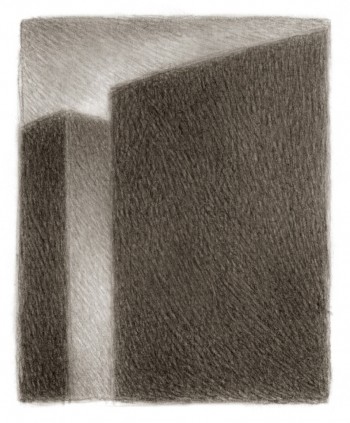 SPURGEON: There were a couple of things in
SPURGEON: There were a couple of things in H Day
I wanted to ask after from a visual standpoint, just as someone who's read a lot of your work. The recurrence of these gigantic shapes, the city blocks, and the notion that this was a comforting image for you. I don't remember ever seeing anything like that particular shape in your work, or anything drawn that depended on that kind of scale. Was that visual element there in your work before and I just didn't see it, or is that something new?
FRENCH: I wish I was keeping a journal for the last five or six years, because I really did hit a wall about five or six years ago -- artistically, I mean -- where I was confused about what I was doing in terms of storytelling. I started to detest
any kind of storytelling. I had a really -- not
violent but very
powerful reaction to my own storytelling in that anything that seemed to over-explain really bothered me, bothered me to the point of hating it.
I would start to make a story. It felt like everything was too contrived. Everything. Anything that had any storytelling -- my own, not other people's. My own. I kept throwing things out. This whole
Towcester Lodge thing, where I had this elaborate story. I was coming out of that and going, "Fuck storytelling. Fuck over-explaining anything. Fuck exposition." And then it was, "Fuck anything that has any element of narrative to it." That's what was going on in my head. [laughs] This anger over why do I have to tell a story?
So I started making these drawings of what I saw when I had headaches. I didn't set out to do a headache series or anything like that. It was what do I know of that I would like to put down on paper that is the least narrative even within one image thing. And that was this place that I go when I have a headache. The reason it's so simple and blank is because it needs to be so that I can concentrate and fall asleep and get rid of the pain. At the same time I was going through this wiping of my brain of narrative, we were driving around having a lot of road trips. I was looking at all this architecture, falling in love with this blank architecture, this block architecture. Usually I'm so minutia-involved, so in love with teeny little things, that the architecture obsession I didn't even know was going on. Like you said, it sort of stands out as being alien.
You didn't say that. [laughs]
SPURGEON: I was thinking it.
FRENCH: It
is alien in my world, this big-scale thing. If I didn't say that this was about headaches, to me the story, if there was a story, was really about the end of the world. It's sort of an end of the world book, that migraine book. It's people being attacked by these clouds and dying. All of these people falling off the building and dying. There's only one survivor: the dog. So it's kind of an end of the world movie... book. [laughter]
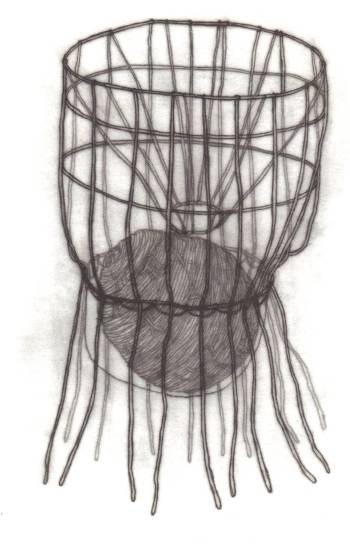 SPURGEON: In the left-hand narrative throughout the book -- and in the right hand narrative in... what do you call the chapters?
SPURGEON: In the left-hand narrative throughout the book -- and in the right hand narrative in... what do you call the chapters?
FRENCH: Stages.
SPURGEON: ... stage five, there's a smudged quality to the lines. That's another thing I'm not used to seeing from you. Can you talk about that effect a bit? Was that just something that you felt like doing? Is there a way you can suggest we take it? Or are we just on our own here?
FRENCH: Well, you
are on your own.
SPURGEON: In the end, we're all on our own, Renée. Let me ask you this, then: was that effect intentional?
FRENCH: Yeah. Oh, yeah. This is again... I'm saying masturbation [laughs] and I don't mean, "Oh, it's just masturbation and anything that's masturbatory isn't valuable to other people." I mean, who doesn't like to watch somebody masturbate? [laughter]
SPURGEON: We have "Charlie Sheen" and "masturbation" in this article. You're doing me tremendous google-favors, I bet.
FRENCH: I'm going to look at them. [sounds of her opening book, flipping pages, then a brief, silent pause] During that whole change thing -- where I hit that wall of "fuck narrative"? -- I started making these line drawings. I was doing it on this
vellum paper, the same vellum paper I'm drawing these others on. There's a depth to it... if you put it on a piece of white paper the light passes through the paper and then bounces off the back of it and comes back up. The graphite rests on a couple of different layers and there's a glowy thing that happens with line on paper. It's something you have to see to get.
I was making these line drawings, and what I loved about it is I've never been a person that erases. Ever. Back in university, or right out of university when I sued color pencils, I never erased. I wasn't a whiteout person. When I used pen and ink I never used whiteout. I didn't do that. I put a line down and it would stay there. It was this permanent thing no matter what I was doing.
So I was in Sydney, and I hit that wall, and I started making thee line drawings of the traps, the crab traps that are in the book.
And erasing. I was using my eraser. [laughs] I was going in, and making my line drawings and then erasing. It was a revelation. I could make a smudge and then erase and then this glowy thing would happen because of the paper. I got into this smudgy thing because of the feel of it. It was about what the pencil felt like on the paper when I was making it, and then erasing it and seeing that weird glow. So it's totally just for me. Those left-hand drawings, they're totally for me. As selfish as that is or whatever, it's very inside myself.
SPURGEON: You travel a lot. You keep two different homes, am I right?
FRENCH: Yeah.
SPURGEON: And you travel in addition to living in these two different places. Is it hard to stay productive as an artist when you're swiping out at least two entirely different contexts for what you're doing?
FRENCH: It is an issue. But it's not about production at all. It's about change. When I'm in Sydney -- and artists have talked about this forever, but you kind of don't believe it until you experience it yourself -- my work looks very different than when I'm in California. It's just automatic. We land there, and two days I'm drawing the way I draw when I'm in Australia. The water is right there. The light in Sydney is very different from the light here in the Bay Area. The air feels different, the smell of the place, the people... I've kind of always thought, "Well, it doesn't matter where I am. Everything I do is from inside of me and therefore it's going to be the same." But that's just not true. You're really affected -- at least I am affected by where I am for sure. Yeah.
SPURGEON: Do you find yourself having to negotiate that?
FRENCH: Yeah. Last time I was in Sydney, this is probably five months ago or something, I was finishing up
H Day.
H Day was primarily done in Sydney. That book's left-hand drawings, those drawings were probably 90 percent done in Sydney. When I finishing up that book, I was writing a play. I was very deep into it. It was my world. It was words. So it was the opposite of my "fuck narrative" thing, because it was all dialogue and no pictures.
When we came back here I had no interest in it. I had a meeting in L.A. with someone, but then after that it just kind of evaporated. I don't know what will happen when I go back there, if I'll pick up on it again or not. I'm not in the right brain to do it. The right hand side drawings in
H Day are very California to me. They're more depressive. My work here tends to be more on the isolated, depressive side. In Sydney it's more open.
SPURGEON: This book came out in 2010 and the one before that, the last narrative work, was 2007. Did you feel there was a difference to how H Day was accepted, received? For example, was the press coverage different?
FRENCH: The press coverage was different. It seemed to me that it was because the book was so
not accessible. I felt going into this one that no one would like it. No one was going to like this at all. I felt so much better that
Jamie Rich wrote to me and said he liked it. I was like, "Whew, that's one. One person liked this book." I felt no one reviewed it because no one liked it and no one wanted to say something mean about it. I was more laid back on the road about it because, again, I wasn't expecting anyone to understand it or whatever. It seemed that it was really quiet. [laughter]
I never talk about the industry, but the whole e-book thing scares me.
SPURGEON: What about digital comics scares you?
FRENCH: Last year I was in the Sydney apartment and there was a blackout in Sydney -- probably a brownout -- a power outage in the city. We live not on the first floor. The elevator is down. I had no charge on my cell phone. Our computer was out, and the landline is hooked into the electricity. I texted Rob [Pike, French's husband], who was at work. My last little text: "I'm in the apartment..." this last text out to the world. And that's it: there was no power. So I lit some candles, and I was drawing. And I read a book with the candle. I realized that if I had a
Kindle, I know those batteries are really awesome, but they don't last forever. If you don't have power, you can't read. But there's the sun, and I could take a book off the shelf and read it. I know that makes me sound like a grandma, but that sounds scary to me. You need power to look at those tings.
SPURGEON: I hadn't thought of it that way.
FRENCH: I hadn't thought of it until we had no power and I was like, "Shit!" Sorry, that was my old lady rant. [laughter]
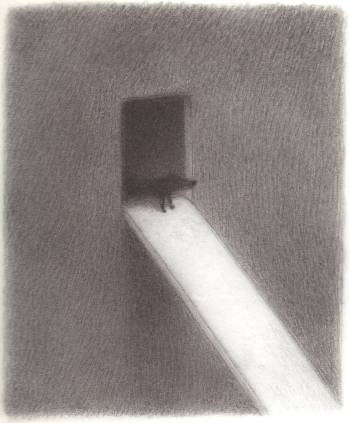 SPURGEON: I think that might do it... I wish I could remember what about your slate of upcoming projects is different than it was in Fall 2010, because I don't know that we hit on it exactly.
SPURGEON: I think that might do it... I wish I could remember what about your slate of upcoming projects is different than it was in Fall 2010, because I don't know that we hit on it exactly.
FRENCH: Oh! You know what? There is a little project that I'm working on. It's an illustration gig. There's a writer,
Steve Matchett, and I'm doing the drawings for the book and it's a 50/50 kind of thing. I'm once again mixed up in one of those things where we don't know what it's going to be like. It's part essays, and autobiographical writing from a
Formula One mechanic and now announcer, and it's part drawings. That's another thing that's sort of fun to do. He's really fun to work with. I can kind of just do drawings for that, and that's relaxing.
SPURGEON: Your drawings are in reaction to the essays?
FRENCH: Yeah. It's kind of a classic illustration thing, but you know how
Ralph Steadman was more 50/50 on those books [with Hunter S. Thompson]? It's more that kind of thing. It's not like a chapter book. There are way more drawings.
It's fun. We're talking about 50 drawings, I think. It's kind of a dream gig for me, because it's F1. There's F1 in there, and also stories about other stuff. This book should be cool because Formula One is in its own world. In F1 you can't get near the drivers. It's harder to get close to them than it is to movie stars. They're like royalty, and the people that work on the cars are working with cutting-edge technology so there's another layer of secrecy. It's cool, but the audience for this book is going to be... a mystery. [Spurgeon laughs] Steve's F1 fans... and then my people are going to be "What is this about again?"
SPURGEON: Even part of me thinks this is a put-on, Renée. [French laughs] I think if you sat down and wrote down 100 future projects for you... I don't think this one would have even made that list.
FRENCH: It is the most unlikely thing ever. Gynecological drawings? Yes. This? No way. [laughter]
*****
*
H Day, Renee French, PictureBox Inc., hardcover, 9780982094709, 216 pages, November 2010, $30.
*****
* all images including cover at top from
H Day
*****
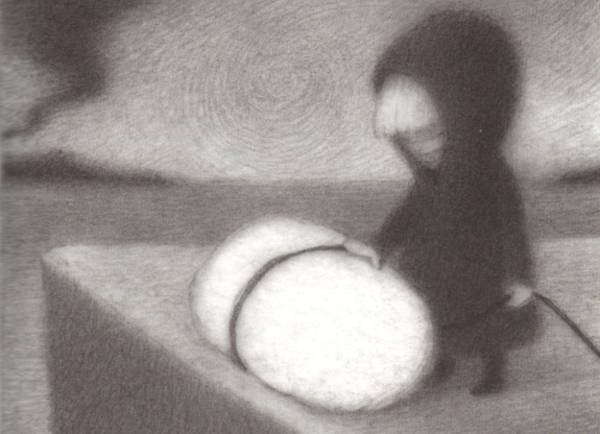
*****
*****


